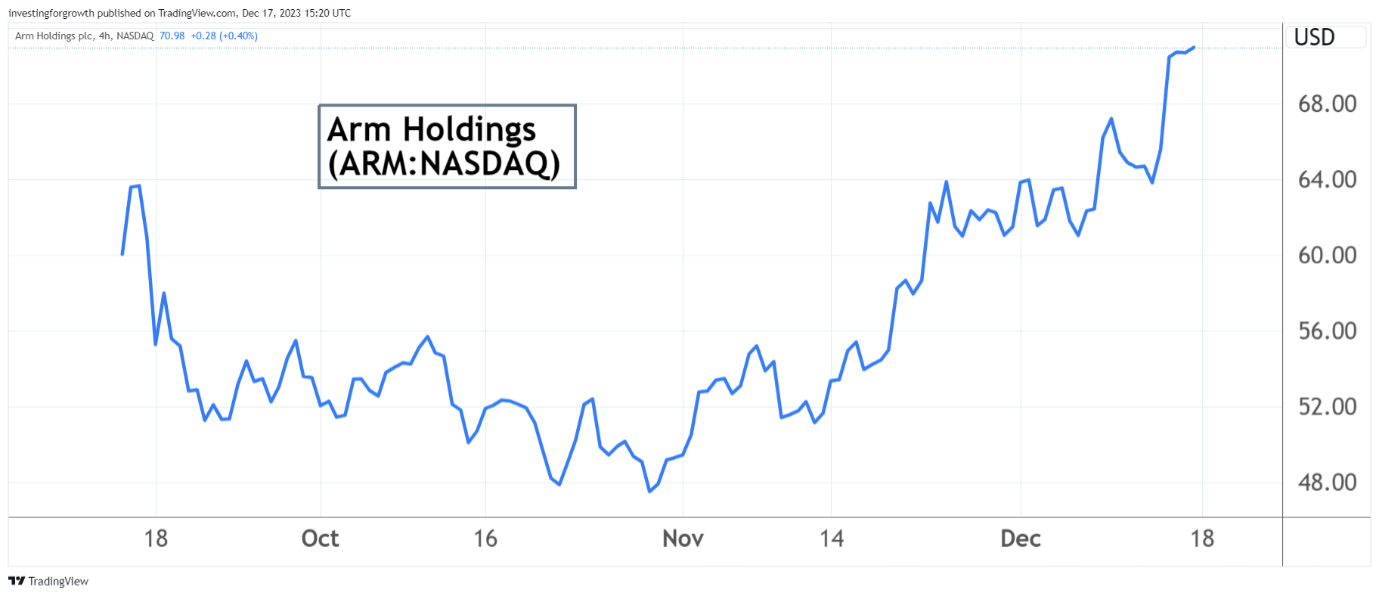Global IPO market in 2023 and outlook for 2024
After another quiet year for new issues in London, some big IPOs on Wall Street might have done well enough to convince other well-known companies to float in 2024. A UK bank is among those likely to grab headlines.
19th December 2023 09:12
by Graeme Evans from interactive investor

The Nasdaq debut of chip designer ARM Holdings ADR (NASDAQ:ARM) and signs of a turning point for interest rates, look to have lifted hopes for an upturn in the IPO market after two poor years.
The $5.2 billion (£4.1 billion) raised in September’s float of Arm was the highlight of a year in which economic conditions frightened off many other potential IPO candidates.
- Invest with ii: Top UK Shares | How to Start Trading Stocks | Open a Trading Account
The recent stock market rally means some of the companies deterred in 2022 and 2023 may now be revisiting their plans, while the IPO pipeline has been given a further boost by speculation of a London listing for Boots 17 years after its private equity takeover.
The optimism will have been helped by the recent performance of Cambridge-based Arm, which was Wall Street’s biggest IPO since electric vehicle maker Rivian Automotive (NASDAQ:RIVN) two years previously. Arm’s IPO was priced at $51 a share for a market valuation of $54.5 billion (£43.3 billion) and closed its first day 25% higher at $63.59 a share.
A reversal of fortunes meant Arm spent October below its starting point before a rebound of 30% in the past month. That should offer encouragement given that investors will want a track record of positive post-IPO performance before taking the plunge on future listings.
It also sends a message to selling shareholders about the need for a more measured approach to IPO valuations. In the case of Arm Holdings, it was priced significantly below the $64 billion (£50.9 billion) when owner SoftBank acquired the 25% stake it did not already own in August.

Source: TradingView. Past performance is not a guide to future performance.
The recent performance of October debutant Birkenstock Holding (NYSE:BIRK), which was initially valued at $8.6 billion (£7 billion) in Wall Street’s third-biggest listing of the year, also offers encouragement after an end-of-year rally returned shares above their float price.
Birkenstock’s owners chose New York over Germany because of the attractive valuations and high trading volumes on offer, with the US also the company’s largest sales region.
- What Arm and Birkenstock tell us about state of global IPO market
- Rolls-Royce and BAE expected to star again in 2024
The most active IPO market has been mainland China due to a number of listings by home-grown technology companies, although proceeds in the most recent quarter were down on a year earlier as the country’s economy shows strain.
The disappointing levels of IPO action in London have come even though secondary markets are showing there is ample liquidity ready to be deployed into public markets.
Against the backdrop of an underperforming FTSE 100 index, EY reported that 23 listings in the UK raised £953 million in the first three quarters of this year. This compared to 34 IPOs raising £1.16 billion over the same period of an already quiet 2022.
Appetite hasn’t been helped by the experience of investors after the 2021 IPO boom was followed by big falls in valuations for the likes of Deliveroo (LSE:ROO), Dr. Martens (LSE:DOCS) and Moonpig (LSE:MOON).
To make matters worse, one of London’s biggest newcomers of this year slumped in dramatic fashion. Shares in CAB Payments Holdings (LSE:CABP) were initially priced at 335p in June’s float worth £851 million before the money transfer firm issued a profit warning three months later.
CAB said revenue growth was 17% below guidance due to severe headwinds affecting its second-largest currency, the Central African franc, as well as the West African franc.
With the conditions compressing margins and reducing trading volume, shares reversed to 60p and have subsequently fallen as far as 46p to cut short CAB’s FTSE 250 stay.
- Why you should think twice about making a big move to cash
- Autumn Statement 2023: NatWest retail share offer plus boost for UK stocks
Despite subdued activity levels, EY’s UK IPO leader Scott McCubbin believes London still has the fundamentals required to be an attractive global destination to list.
He points to “an exceptionally strong” financial advisory sector, a well-regulated stock exchange and a liquid investor base.
McCubbin adds: “The FCA’s review into simplifying the listings regime to help make London a more appealing destination for a wider range of companies is a welcome step, however it is important that we strike the right balance between reducing red tape while continuing to safeguard protections for investors and other stakeholders."
In terms of IPO candidates for 2024, the recent speculation linking retailer Boots to a stock market return is one of the most eye-catching for investors.
According to a report by Bloomberg News, the chain could be valued at about £7 billion should US-listed owner Walgreens Boots Alliance Inc (NASDAQ:WBA) proceed with a break-up. FTSE 100-listed Boots was bought by private equity in 2007.
Another candidate is Raspberry Pi as the technology business continues its recovery from the disruption of pandemic-era chip shortages.
Co-founder and chief executive Eben Upton reportedly told an event in Cambridge in October that the business is ready and that the narrative suggesting new technology listings should be in New York rather than London felt overblown.
Speculation has also focused on meal replacement maker Huel, although the Financial Times said in November that the company had not revived the interest it held prior to the freeze in IPO markets two years ago.
- Royal Mail’s 10 years since IPO: what has it delivered?
- 2024 look ahead: a recovery reaching MATURITY?
One planned offer of shares in 2024 that investors already know plenty about involves the government’s disposal of its stake in NatWest.
A decade after the 2013 listing of Royal Mail (International Distributions Services (LSE:IDS)) saw the delivery firm’s shares more than 20 times oversubscribed, chancellor Jeremy Hunt is hoping a sale of NatWest (LSE:NWG) will help to reinvigorate interest in UK stocks and get “Sid investing again”.
The move, which is subject to supportive market conditions and value for the taxpayer, is part of the government’s commitment for a full exit of its NatWest stake by 2025-26. Its holding has fallen from 84% after the 2008 rescue of Royal Bank of Scotland to below 40%.
The shares come with an enticing dividend yield of 7%, but with the City increasingly cautious about prospects after a 20% decline in valuation this year.
These articles are provided for information purposes only. Occasionally, an opinion about whether to buy or sell a specific investment may be provided by third parties. The content is not intended to be a personal recommendation to buy or sell any financial instrument or product, or to adopt any investment strategy as it is not provided based on an assessment of your investing knowledge and experience, your financial situation or your investment objectives. The value of your investments, and the income derived from them, may go down as well as up. You may not get back all the money that you invest. The investments referred to in this article may not be suitable for all investors, and if in doubt, an investor should seek advice from a qualified investment adviser.
Full performance can be found on the company or index summary page on the interactive investor website. Simply click on the company's or index name highlighted in the article.